UNCC300 Essay: Justice, Change, and Common Good in a Global World
VerifiedAdded on 2023/03/29
|7
|1577
|114
Essay
AI Summary
This essay critically examines the global issue of fast food consumption and its detrimental effects on health, highlighting the unrealized shared responsibilities for the common good. It emphasizes the principles of Catholic Social Teaching (CST), particularly human dignity and the common good, in addressing this challenge. The essay proposes solutions at local and global levels, including raising awareness, government interventions like taxation, and improving disciplinary measures for food quality. It also stresses the importance of collaboration between countries, communities, and healthcare professionals, such as nurses, in promoting healthy lifestyles and ensuring that fast food manufacturers prioritize the well-being of their consumers. The author also suggests to report to concerned departments like Food Standards Australia New Zealand (FSANZ) in Australia if fast food manufacturing companies are not performing their duties in Australia or any other countries, then for common good it must be reported to concerned department. Ultimately, the essay advocates for a collective effort to uphold human dignity and achieve the common good in the face of global health challenges, with the goal to ensure that every man, women can live a life of dignity.
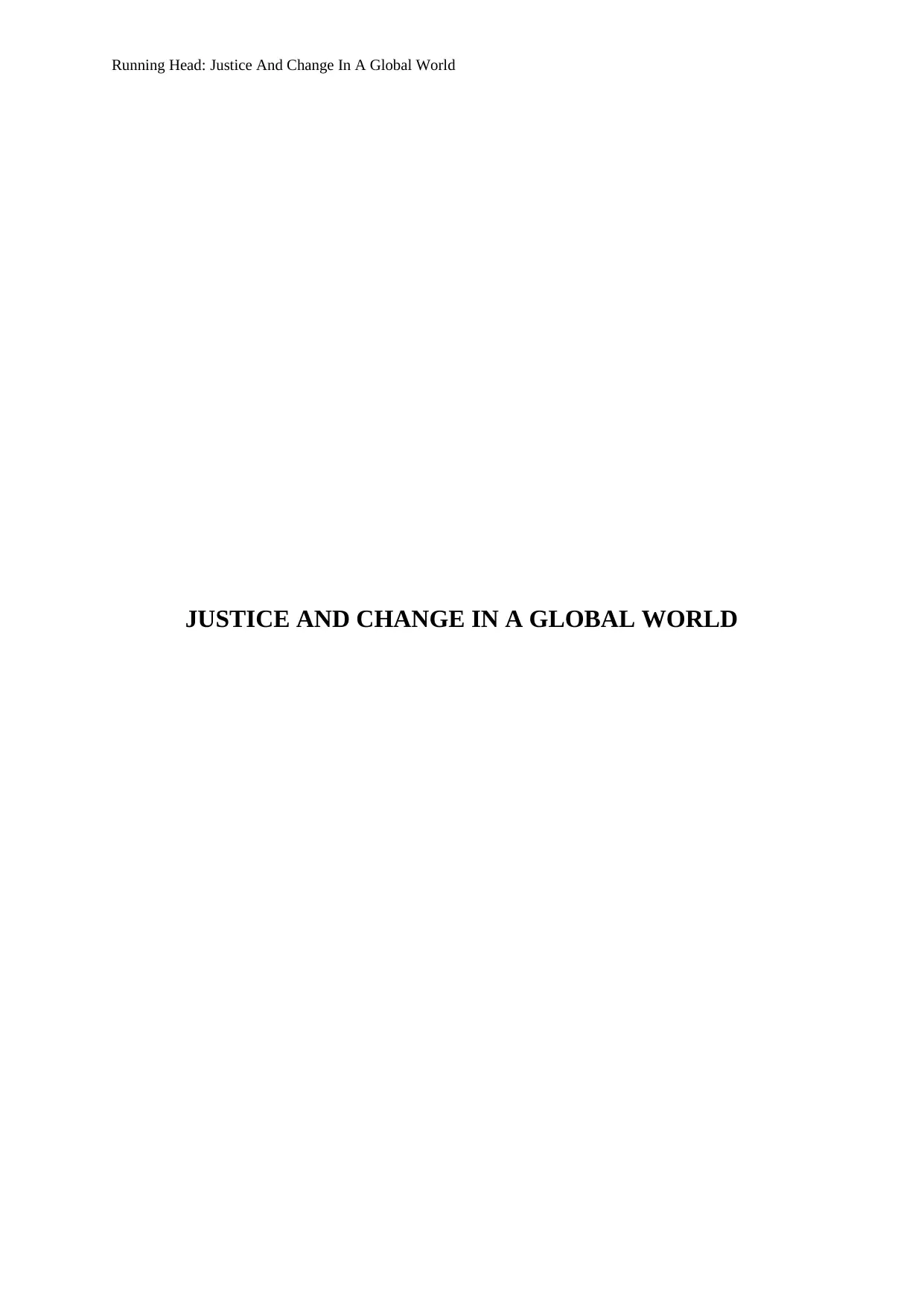
Running Head: Justice And Change In A Global World
JUSTICE AND CHANGE IN A GLOBAL WORLD
JUSTICE AND CHANGE IN A GLOBAL WORLD
Paraphrase This Document
Need a fresh take? Get an instant paraphrase of this document with our AI Paraphraser
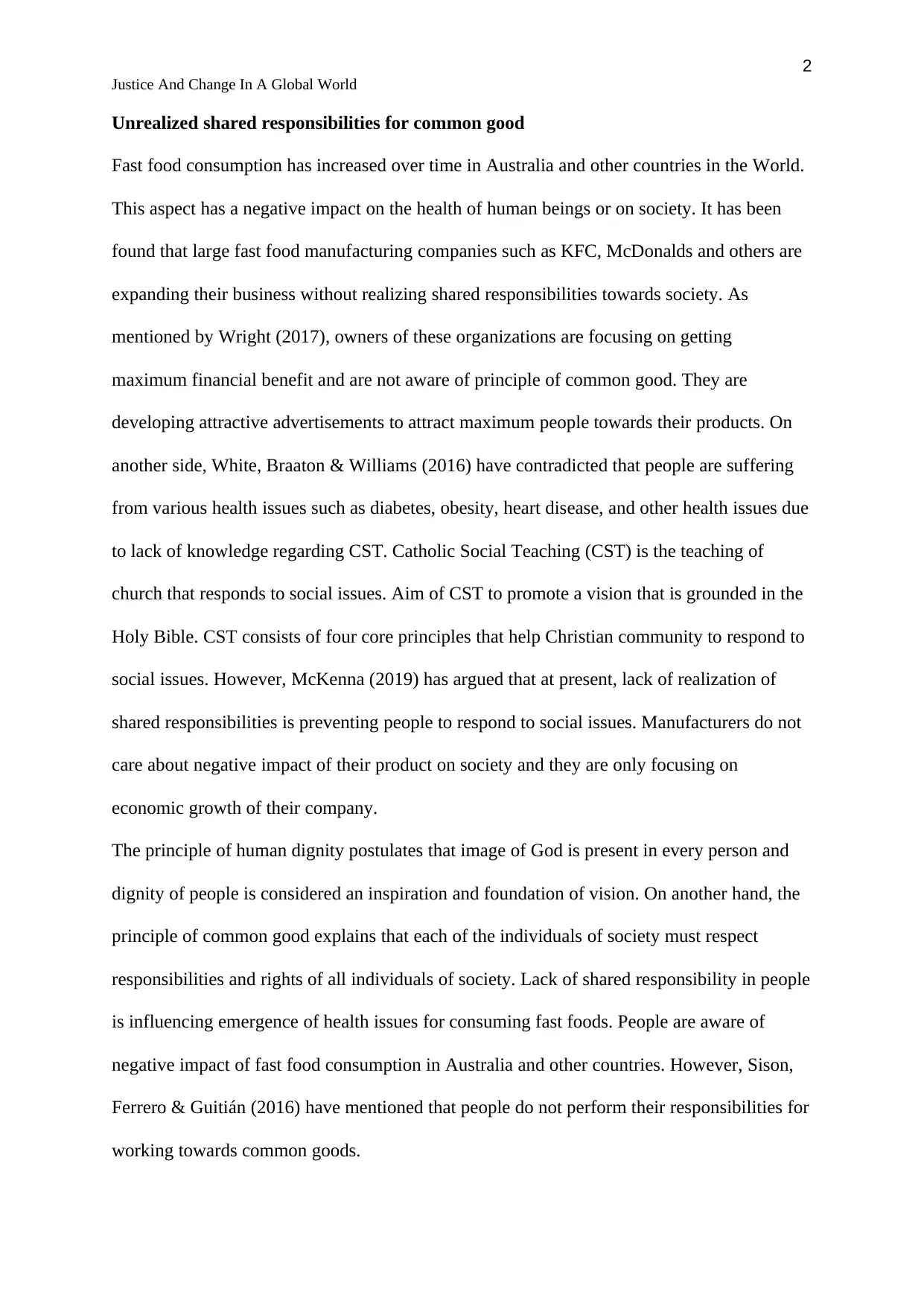
2
Justice And Change In A Global World
Unrealized shared responsibilities for common good
Fast food consumption has increased over time in Australia and other countries in the World.
This aspect has a negative impact on the health of human beings or on society. It has been
found that large fast food manufacturing companies such as KFC, McDonalds and others are
expanding their business without realizing shared responsibilities towards society. As
mentioned by Wright (2017), owners of these organizations are focusing on getting
maximum financial benefit and are not aware of principle of common good. They are
developing attractive advertisements to attract maximum people towards their products. On
another side, White, Braaton & Williams (2016) have contradicted that people are suffering
from various health issues such as diabetes, obesity, heart disease, and other health issues due
to lack of knowledge regarding CST. Catholic Social Teaching (CST) is the teaching of
church that responds to social issues. Aim of CST to promote a vision that is grounded in the
Holy Bible. CST consists of four core principles that help Christian community to respond to
social issues. However, McKenna (2019) has argued that at present, lack of realization of
shared responsibilities is preventing people to respond to social issues. Manufacturers do not
care about negative impact of their product on society and they are only focusing on
economic growth of their company.
The principle of human dignity postulates that image of God is present in every person and
dignity of people is considered an inspiration and foundation of vision. On another hand, the
principle of common good explains that each of the individuals of society must respect
responsibilities and rights of all individuals of society. Lack of shared responsibility in people
is influencing emergence of health issues for consuming fast foods. People are aware of
negative impact of fast food consumption in Australia and other countries. However, Sison,
Ferrero & Guitián (2016) have mentioned that people do not perform their responsibilities for
working towards common goods.
Justice And Change In A Global World
Unrealized shared responsibilities for common good
Fast food consumption has increased over time in Australia and other countries in the World.
This aspect has a negative impact on the health of human beings or on society. It has been
found that large fast food manufacturing companies such as KFC, McDonalds and others are
expanding their business without realizing shared responsibilities towards society. As
mentioned by Wright (2017), owners of these organizations are focusing on getting
maximum financial benefit and are not aware of principle of common good. They are
developing attractive advertisements to attract maximum people towards their products. On
another side, White, Braaton & Williams (2016) have contradicted that people are suffering
from various health issues such as diabetes, obesity, heart disease, and other health issues due
to lack of knowledge regarding CST. Catholic Social Teaching (CST) is the teaching of
church that responds to social issues. Aim of CST to promote a vision that is grounded in the
Holy Bible. CST consists of four core principles that help Christian community to respond to
social issues. However, McKenna (2019) has argued that at present, lack of realization of
shared responsibilities is preventing people to respond to social issues. Manufacturers do not
care about negative impact of their product on society and they are only focusing on
economic growth of their company.
The principle of human dignity postulates that image of God is present in every person and
dignity of people is considered an inspiration and foundation of vision. On another hand, the
principle of common good explains that each of the individuals of society must respect
responsibilities and rights of all individuals of society. Lack of shared responsibility in people
is influencing emergence of health issues for consuming fast foods. People are aware of
negative impact of fast food consumption in Australia and other countries. However, Sison,
Ferrero & Guitián (2016) have mentioned that people do not perform their responsibilities for
working towards common goods.
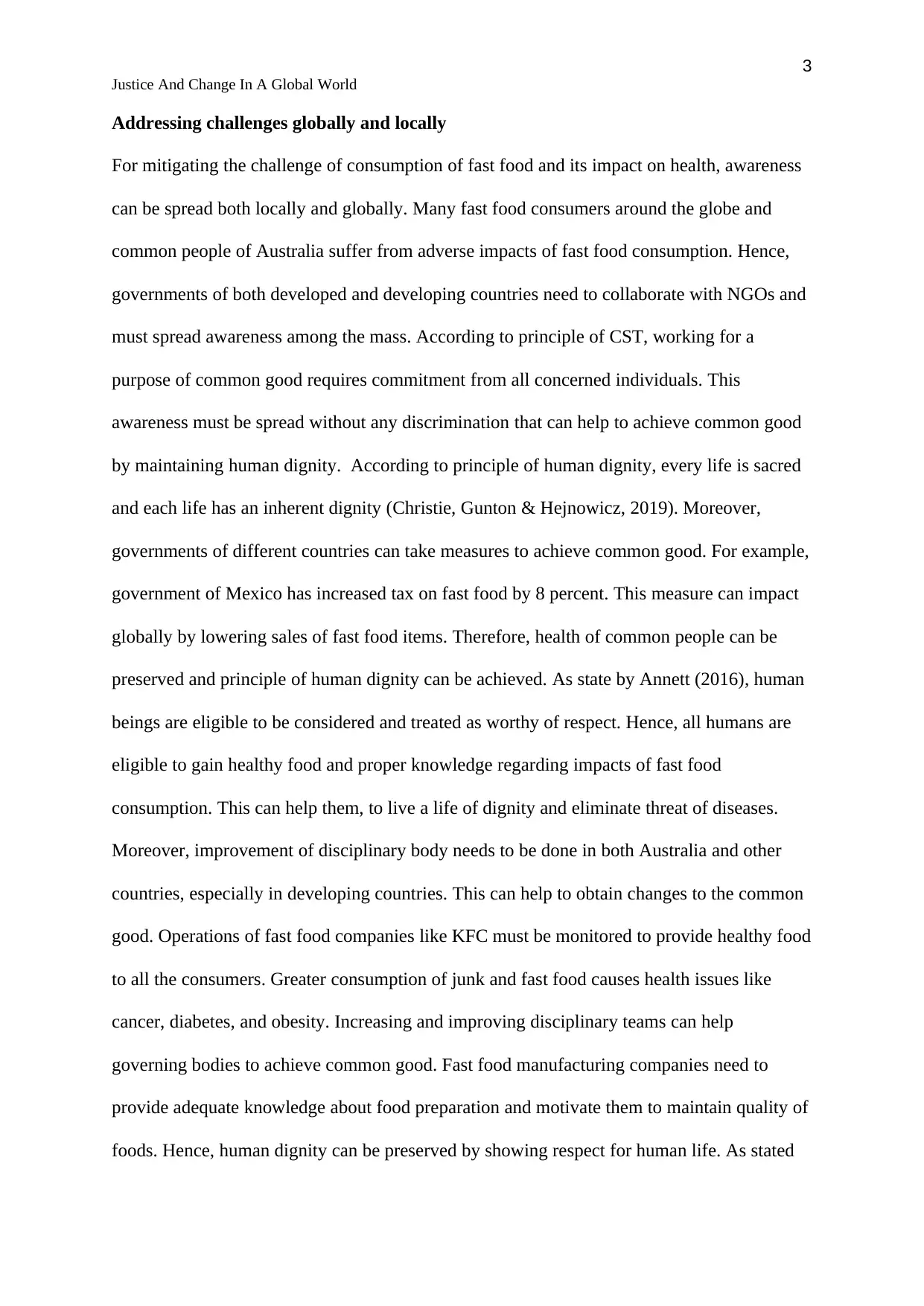
3
Justice And Change In A Global World
Addressing challenges globally and locally
For mitigating the challenge of consumption of fast food and its impact on health, awareness
can be spread both locally and globally. Many fast food consumers around the globe and
common people of Australia suffer from adverse impacts of fast food consumption. Hence,
governments of both developed and developing countries need to collaborate with NGOs and
must spread awareness among the mass. According to principle of CST, working for a
purpose of common good requires commitment from all concerned individuals. This
awareness must be spread without any discrimination that can help to achieve common good
by maintaining human dignity. According to principle of human dignity, every life is sacred
and each life has an inherent dignity (Christie, Gunton & Hejnowicz, 2019). Moreover,
governments of different countries can take measures to achieve common good. For example,
government of Mexico has increased tax on fast food by 8 percent. This measure can impact
globally by lowering sales of fast food items. Therefore, health of common people can be
preserved and principle of human dignity can be achieved. As state by Annett (2016), human
beings are eligible to be considered and treated as worthy of respect. Hence, all humans are
eligible to gain healthy food and proper knowledge regarding impacts of fast food
consumption. This can help them, to live a life of dignity and eliminate threat of diseases.
Moreover, improvement of disciplinary body needs to be done in both Australia and other
countries, especially in developing countries. This can help to obtain changes to the common
good. Operations of fast food companies like KFC must be monitored to provide healthy food
to all the consumers. Greater consumption of junk and fast food causes health issues like
cancer, diabetes, and obesity. Increasing and improving disciplinary teams can help
governing bodies to achieve common good. Fast food manufacturing companies need to
provide adequate knowledge about food preparation and motivate them to maintain quality of
foods. Hence, human dignity can be preserved by showing respect for human life. As stated
Justice And Change In A Global World
Addressing challenges globally and locally
For mitigating the challenge of consumption of fast food and its impact on health, awareness
can be spread both locally and globally. Many fast food consumers around the globe and
common people of Australia suffer from adverse impacts of fast food consumption. Hence,
governments of both developed and developing countries need to collaborate with NGOs and
must spread awareness among the mass. According to principle of CST, working for a
purpose of common good requires commitment from all concerned individuals. This
awareness must be spread without any discrimination that can help to achieve common good
by maintaining human dignity. According to principle of human dignity, every life is sacred
and each life has an inherent dignity (Christie, Gunton & Hejnowicz, 2019). Moreover,
governments of different countries can take measures to achieve common good. For example,
government of Mexico has increased tax on fast food by 8 percent. This measure can impact
globally by lowering sales of fast food items. Therefore, health of common people can be
preserved and principle of human dignity can be achieved. As state by Annett (2016), human
beings are eligible to be considered and treated as worthy of respect. Hence, all humans are
eligible to gain healthy food and proper knowledge regarding impacts of fast food
consumption. This can help them, to live a life of dignity and eliminate threat of diseases.
Moreover, improvement of disciplinary body needs to be done in both Australia and other
countries, especially in developing countries. This can help to obtain changes to the common
good. Operations of fast food companies like KFC must be monitored to provide healthy food
to all the consumers. Greater consumption of junk and fast food causes health issues like
cancer, diabetes, and obesity. Increasing and improving disciplinary teams can help
governing bodies to achieve common good. Fast food manufacturing companies need to
provide adequate knowledge about food preparation and motivate them to maintain quality of
foods. Hence, human dignity can be preserved by showing respect for human life. As stated
⊘ This is a preview!⊘
Do you want full access?
Subscribe today to unlock all pages.

Trusted by 1+ million students worldwide
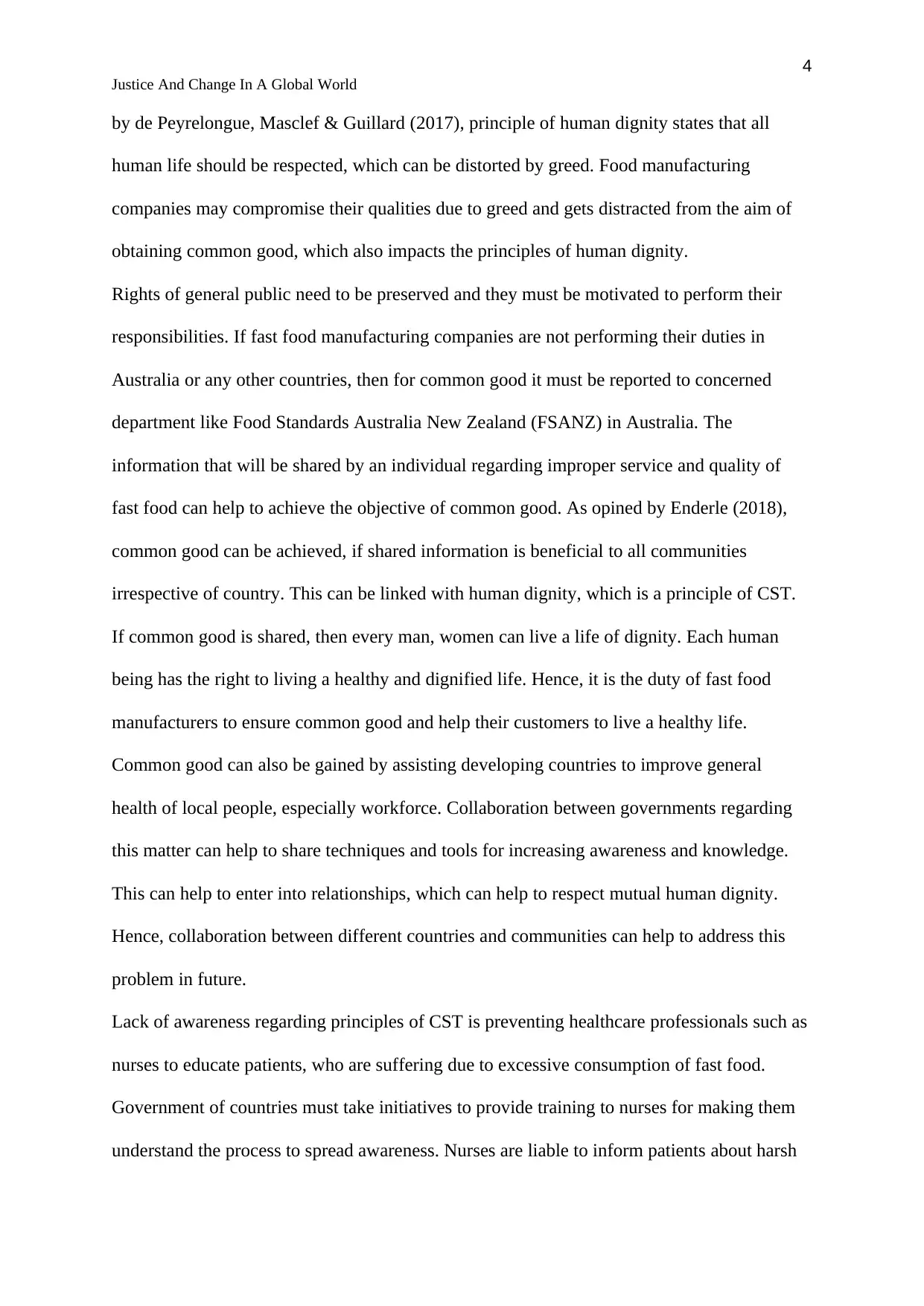
4
Justice And Change In A Global World
by de Peyrelongue, Masclef & Guillard (2017), principle of human dignity states that all
human life should be respected, which can be distorted by greed. Food manufacturing
companies may compromise their qualities due to greed and gets distracted from the aim of
obtaining common good, which also impacts the principles of human dignity.
Rights of general public need to be preserved and they must be motivated to perform their
responsibilities. If fast food manufacturing companies are not performing their duties in
Australia or any other countries, then for common good it must be reported to concerned
department like Food Standards Australia New Zealand (FSANZ) in Australia. The
information that will be shared by an individual regarding improper service and quality of
fast food can help to achieve the objective of common good. As opined by Enderle (2018),
common good can be achieved, if shared information is beneficial to all communities
irrespective of country. This can be linked with human dignity, which is a principle of CST.
If common good is shared, then every man, women can live a life of dignity. Each human
being has the right to living a healthy and dignified life. Hence, it is the duty of fast food
manufacturers to ensure common good and help their customers to live a healthy life.
Common good can also be gained by assisting developing countries to improve general
health of local people, especially workforce. Collaboration between governments regarding
this matter can help to share techniques and tools for increasing awareness and knowledge.
This can help to enter into relationships, which can help to respect mutual human dignity.
Hence, collaboration between different countries and communities can help to address this
problem in future.
Lack of awareness regarding principles of CST is preventing healthcare professionals such as
nurses to educate patients, who are suffering due to excessive consumption of fast food.
Government of countries must take initiatives to provide training to nurses for making them
understand the process to spread awareness. Nurses are liable to inform patients about harsh
Justice And Change In A Global World
by de Peyrelongue, Masclef & Guillard (2017), principle of human dignity states that all
human life should be respected, which can be distorted by greed. Food manufacturing
companies may compromise their qualities due to greed and gets distracted from the aim of
obtaining common good, which also impacts the principles of human dignity.
Rights of general public need to be preserved and they must be motivated to perform their
responsibilities. If fast food manufacturing companies are not performing their duties in
Australia or any other countries, then for common good it must be reported to concerned
department like Food Standards Australia New Zealand (FSANZ) in Australia. The
information that will be shared by an individual regarding improper service and quality of
fast food can help to achieve the objective of common good. As opined by Enderle (2018),
common good can be achieved, if shared information is beneficial to all communities
irrespective of country. This can be linked with human dignity, which is a principle of CST.
If common good is shared, then every man, women can live a life of dignity. Each human
being has the right to living a healthy and dignified life. Hence, it is the duty of fast food
manufacturers to ensure common good and help their customers to live a healthy life.
Common good can also be gained by assisting developing countries to improve general
health of local people, especially workforce. Collaboration between governments regarding
this matter can help to share techniques and tools for increasing awareness and knowledge.
This can help to enter into relationships, which can help to respect mutual human dignity.
Hence, collaboration between different countries and communities can help to address this
problem in future.
Lack of awareness regarding principles of CST is preventing healthcare professionals such as
nurses to educate patients, who are suffering due to excessive consumption of fast food.
Government of countries must take initiatives to provide training to nurses for making them
understand the process to spread awareness. Nurses are liable to inform patients about harsh
Paraphrase This Document
Need a fresh take? Get an instant paraphrase of this document with our AI Paraphraser
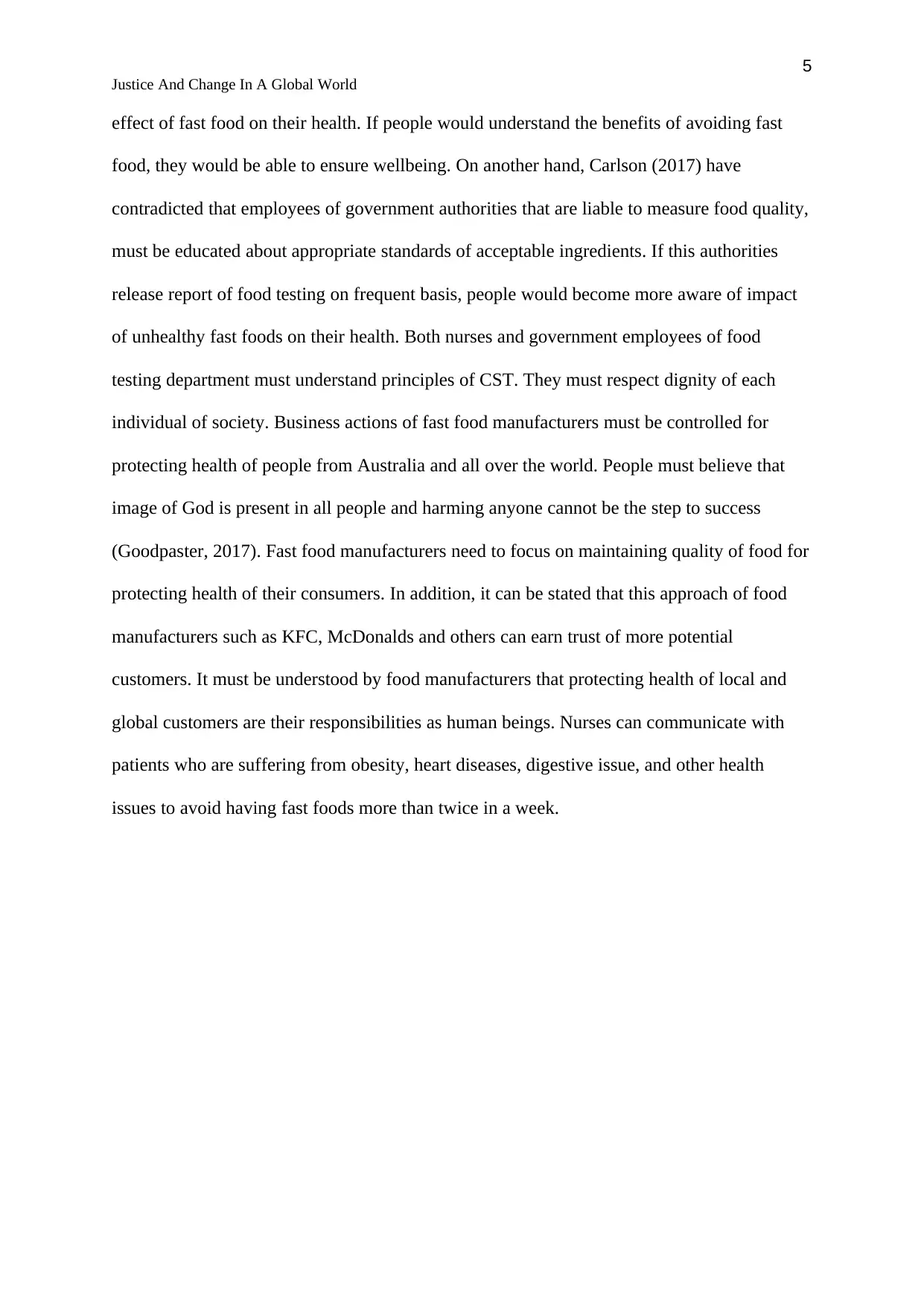
5
Justice And Change In A Global World
effect of fast food on their health. If people would understand the benefits of avoiding fast
food, they would be able to ensure wellbeing. On another hand, Carlson (2017) have
contradicted that employees of government authorities that are liable to measure food quality,
must be educated about appropriate standards of acceptable ingredients. If this authorities
release report of food testing on frequent basis, people would become more aware of impact
of unhealthy fast foods on their health. Both nurses and government employees of food
testing department must understand principles of CST. They must respect dignity of each
individual of society. Business actions of fast food manufacturers must be controlled for
protecting health of people from Australia and all over the world. People must believe that
image of God is present in all people and harming anyone cannot be the step to success
(Goodpaster, 2017). Fast food manufacturers need to focus on maintaining quality of food for
protecting health of their consumers. In addition, it can be stated that this approach of food
manufacturers such as KFC, McDonalds and others can earn trust of more potential
customers. It must be understood by food manufacturers that protecting health of local and
global customers are their responsibilities as human beings. Nurses can communicate with
patients who are suffering from obesity, heart diseases, digestive issue, and other health
issues to avoid having fast foods more than twice in a week.
Justice And Change In A Global World
effect of fast food on their health. If people would understand the benefits of avoiding fast
food, they would be able to ensure wellbeing. On another hand, Carlson (2017) have
contradicted that employees of government authorities that are liable to measure food quality,
must be educated about appropriate standards of acceptable ingredients. If this authorities
release report of food testing on frequent basis, people would become more aware of impact
of unhealthy fast foods on their health. Both nurses and government employees of food
testing department must understand principles of CST. They must respect dignity of each
individual of society. Business actions of fast food manufacturers must be controlled for
protecting health of people from Australia and all over the world. People must believe that
image of God is present in all people and harming anyone cannot be the step to success
(Goodpaster, 2017). Fast food manufacturers need to focus on maintaining quality of food for
protecting health of their consumers. In addition, it can be stated that this approach of food
manufacturers such as KFC, McDonalds and others can earn trust of more potential
customers. It must be understood by food manufacturers that protecting health of local and
global customers are their responsibilities as human beings. Nurses can communicate with
patients who are suffering from obesity, heart diseases, digestive issue, and other health
issues to avoid having fast foods more than twice in a week.
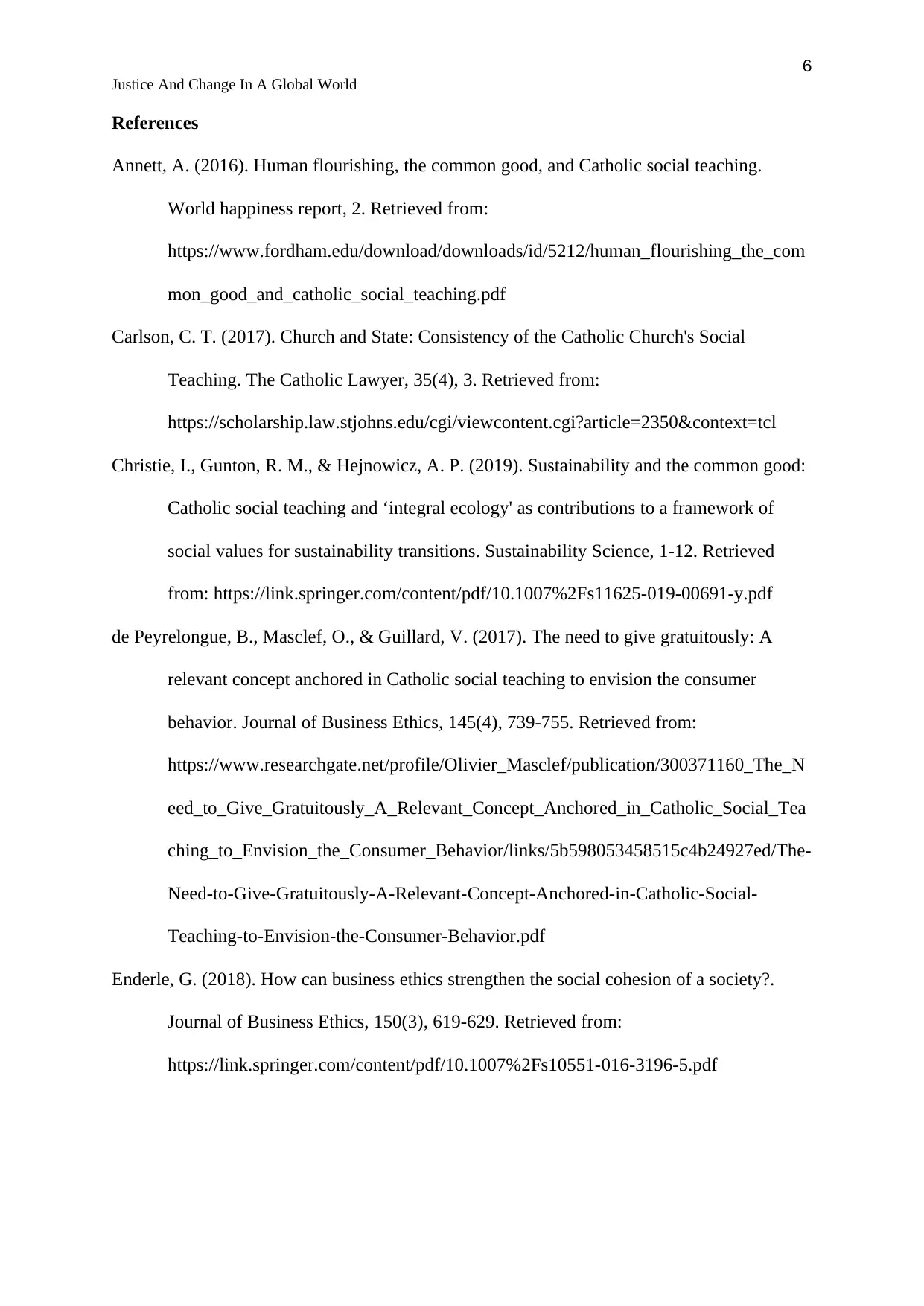
6
Justice And Change In A Global World
References
Annett, A. (2016). Human flourishing, the common good, and Catholic social teaching.
World happiness report, 2. Retrieved from:
https://www.fordham.edu/download/downloads/id/5212/human_flourishing_the_com
mon_good_and_catholic_social_teaching.pdf
Carlson, C. T. (2017). Church and State: Consistency of the Catholic Church's Social
Teaching. The Catholic Lawyer, 35(4), 3. Retrieved from:
https://scholarship.law.stjohns.edu/cgi/viewcontent.cgi?article=2350&context=tcl
Christie, I., Gunton, R. M., & Hejnowicz, A. P. (2019). Sustainability and the common good:
Catholic social teaching and ‘integral ecology' as contributions to a framework of
social values for sustainability transitions. Sustainability Science, 1-12. Retrieved
from: https://link.springer.com/content/pdf/10.1007%2Fs11625-019-00691-y.pdf
de Peyrelongue, B., Masclef, O., & Guillard, V. (2017). The need to give gratuitously: A
relevant concept anchored in Catholic social teaching to envision the consumer
behavior. Journal of Business Ethics, 145(4), 739-755. Retrieved from:
https://www.researchgate.net/profile/Olivier_Masclef/publication/300371160_The_N
eed_to_Give_Gratuitously_A_Relevant_Concept_Anchored_in_Catholic_Social_Tea
ching_to_Envision_the_Consumer_Behavior/links/5b598053458515c4b24927ed/The-
Need-to-Give-Gratuitously-A-Relevant-Concept-Anchored-in-Catholic-Social-
Teaching-to-Envision-the-Consumer-Behavior.pdf
Enderle, G. (2018). How can business ethics strengthen the social cohesion of a society?.
Journal of Business Ethics, 150(3), 619-629. Retrieved from:
https://link.springer.com/content/pdf/10.1007%2Fs10551-016-3196-5.pdf
Justice And Change In A Global World
References
Annett, A. (2016). Human flourishing, the common good, and Catholic social teaching.
World happiness report, 2. Retrieved from:
https://www.fordham.edu/download/downloads/id/5212/human_flourishing_the_com
mon_good_and_catholic_social_teaching.pdf
Carlson, C. T. (2017). Church and State: Consistency of the Catholic Church's Social
Teaching. The Catholic Lawyer, 35(4), 3. Retrieved from:
https://scholarship.law.stjohns.edu/cgi/viewcontent.cgi?article=2350&context=tcl
Christie, I., Gunton, R. M., & Hejnowicz, A. P. (2019). Sustainability and the common good:
Catholic social teaching and ‘integral ecology' as contributions to a framework of
social values for sustainability transitions. Sustainability Science, 1-12. Retrieved
from: https://link.springer.com/content/pdf/10.1007%2Fs11625-019-00691-y.pdf
de Peyrelongue, B., Masclef, O., & Guillard, V. (2017). The need to give gratuitously: A
relevant concept anchored in Catholic social teaching to envision the consumer
behavior. Journal of Business Ethics, 145(4), 739-755. Retrieved from:
https://www.researchgate.net/profile/Olivier_Masclef/publication/300371160_The_N
eed_to_Give_Gratuitously_A_Relevant_Concept_Anchored_in_Catholic_Social_Tea
ching_to_Envision_the_Consumer_Behavior/links/5b598053458515c4b24927ed/The-
Need-to-Give-Gratuitously-A-Relevant-Concept-Anchored-in-Catholic-Social-
Teaching-to-Envision-the-Consumer-Behavior.pdf
Enderle, G. (2018). How can business ethics strengthen the social cohesion of a society?.
Journal of Business Ethics, 150(3), 619-629. Retrieved from:
https://link.springer.com/content/pdf/10.1007%2Fs10551-016-3196-5.pdf
⊘ This is a preview!⊘
Do you want full access?
Subscribe today to unlock all pages.

Trusted by 1+ million students worldwide
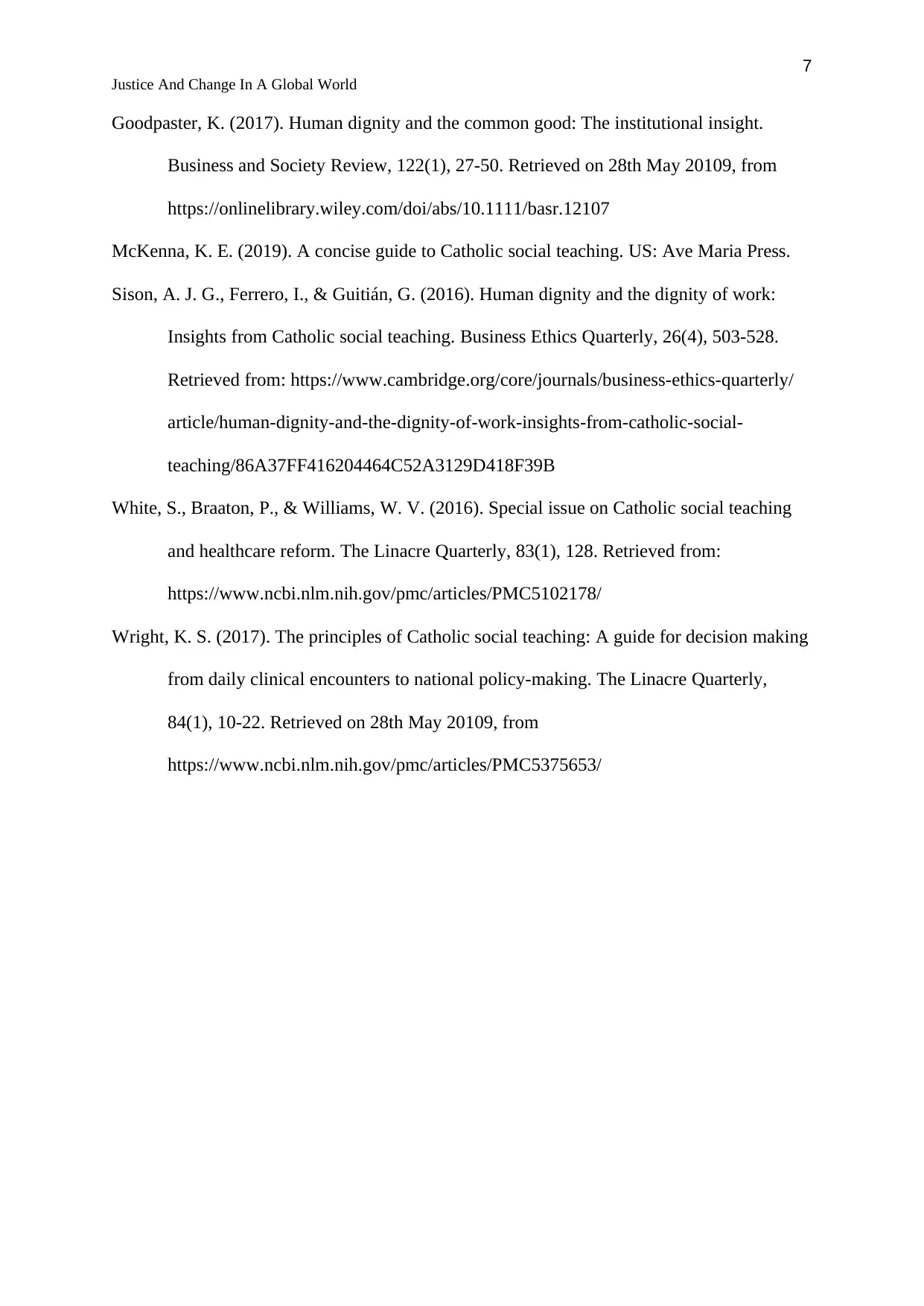
7
Justice And Change In A Global World
Goodpaster, K. (2017). Human dignity and the common good: The institutional insight.
Business and Society Review, 122(1), 27-50. Retrieved on 28th May 20109, from
https://onlinelibrary.wiley.com/doi/abs/10.1111/basr.12107
McKenna, K. E. (2019). A concise guide to Catholic social teaching. US: Ave Maria Press.
Sison, A. J. G., Ferrero, I., & Guitián, G. (2016). Human dignity and the dignity of work:
Insights from Catholic social teaching. Business Ethics Quarterly, 26(4), 503-528.
Retrieved from: https://www.cambridge.org/core/journals/business-ethics-quarterly/
article/human-dignity-and-the-dignity-of-work-insights-from-catholic-social-
teaching/86A37FF416204464C52A3129D418F39B
White, S., Braaton, P., & Williams, W. V. (2016). Special issue on Catholic social teaching
and healthcare reform. The Linacre Quarterly, 83(1), 128. Retrieved from:
https://www.ncbi.nlm.nih.gov/pmc/articles/PMC5102178/
Wright, K. S. (2017). The principles of Catholic social teaching: A guide for decision making
from daily clinical encounters to national policy-making. The Linacre Quarterly,
84(1), 10-22. Retrieved on 28th May 20109, from
https://www.ncbi.nlm.nih.gov/pmc/articles/PMC5375653/
Justice And Change In A Global World
Goodpaster, K. (2017). Human dignity and the common good: The institutional insight.
Business and Society Review, 122(1), 27-50. Retrieved on 28th May 20109, from
https://onlinelibrary.wiley.com/doi/abs/10.1111/basr.12107
McKenna, K. E. (2019). A concise guide to Catholic social teaching. US: Ave Maria Press.
Sison, A. J. G., Ferrero, I., & Guitián, G. (2016). Human dignity and the dignity of work:
Insights from Catholic social teaching. Business Ethics Quarterly, 26(4), 503-528.
Retrieved from: https://www.cambridge.org/core/journals/business-ethics-quarterly/
article/human-dignity-and-the-dignity-of-work-insights-from-catholic-social-
teaching/86A37FF416204464C52A3129D418F39B
White, S., Braaton, P., & Williams, W. V. (2016). Special issue on Catholic social teaching
and healthcare reform. The Linacre Quarterly, 83(1), 128. Retrieved from:
https://www.ncbi.nlm.nih.gov/pmc/articles/PMC5102178/
Wright, K. S. (2017). The principles of Catholic social teaching: A guide for decision making
from daily clinical encounters to national policy-making. The Linacre Quarterly,
84(1), 10-22. Retrieved on 28th May 20109, from
https://www.ncbi.nlm.nih.gov/pmc/articles/PMC5375653/
1 out of 7
Related Documents
Your All-in-One AI-Powered Toolkit for Academic Success.
+13062052269
info@desklib.com
Available 24*7 on WhatsApp / Email
![[object Object]](/_next/static/media/star-bottom.7253800d.svg)
Unlock your academic potential
Copyright © 2020–2026 A2Z Services. All Rights Reserved. Developed and managed by ZUCOL.




